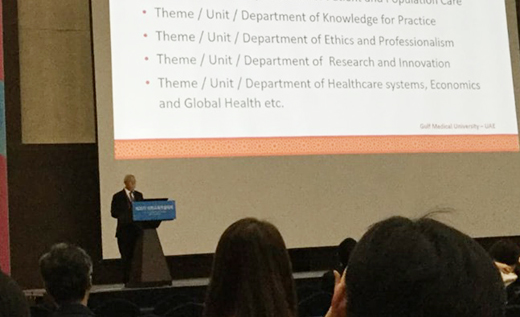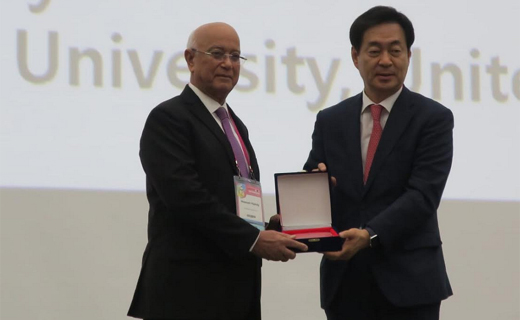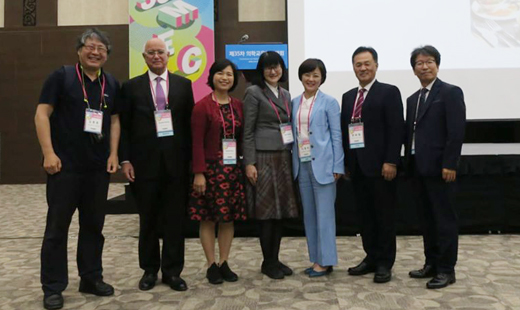Gulf Medical University Chancellor Prof. Hossam Hamdy Addresses Korean Society of Medical Education
Gulf Medical University Chancellor Prof. Hossam Hamdy Addresses Korean Society of Medical Education
Mangalore Today News Network
June 03, 2019: The Chancellor delivered his keynote speech and lecture addressing a gathering of 500+ participants including attendees from 47 leading medical colleges in Korea.



Prof. Hossam Hamdy, the Chancellor of Gulf Medical University (GMU), Ajman – the leading medical university in the Middle East region – delivered the keynote lecture at the 35th Korean Medical Education Congress held at Busan City, South Korea on 30th May 2019. Organized by the Korean Society of Medical Education, Korea Association of Medical Colleges, the congress was themed ‘Creativeness and Values in Medical Education’ and explored the changing trends and opportunities in medical education and research.
Prof. Hossam Hamdy presented the plenary lecture of the Congress. Delivering the hour-long keynote speech on ‘Transformation of Medical Education for the Future: from Informative to Transformative’, he addressed a gathering of over 500 participants, including attendees from 47 leading medical colleges in Korea.
Reflecting on the future of medical education worldwide, Prof. Hossam Hamdy said that the field of medicine is a social science, dealing with people, societies and human interaction. Stressing upon the humanistic aspect of medicine, he said, “We should not forget that medicine is a social science and it is about human beings. The next generation health professions should be competent in treating the next generation patients in a value-based Healthcare System,” he said.
He explained how medical education and training was poised for major changes in the future, as modern medical education is embedded in advanced technology. Prof. Hossam Hamdy said that future technology will be disruptive and transform existing medical educational models. “Artificial intelligence and machine learning will influence how students learn. Physical learning spaces will reflect and express the underlying assumptions about what authentic learning and teaching are and embedding the learners in the work environment,” he said.
Prof. Hossam Hamdy further opined that Academic Healthcare Systems and innovation will be the norms for future medical education. “The training of students will be in all healthcare related facilities in the community,” he emphasized, adding, “Entrustable professional activities will be measured more frequently at different points of the students learning trajectory checking their ‘Readiness for Practice’ in a multidisciplinary team-based practice.”
Prof. Hossam Hamdy also stated that research and innovation will be integral to the students’ learning experience. “Students should be exposed to how researchers think and behave and be embedded in a research environment. Public-private partnership in education and research will spread and become more regulated and encouraged,” he explained.
Speaking about Gulf Medical University’s growing network of partner universities worldwide, Prof. Hossam Hamdy revealed that GMU is in the process of exploring opportunities for collaboration with several top universities in Korea. “The healthcare system in South Korea boasts a very advanced healthcare system that is technologically intense. GMU will collaborate with the leading names in medical education and healthcare in South Korea, for exchanges and joint programs in academia, healthcare and research,” he elaborated.
In appreciation of his keynote lecture at the Congress, Prof. Hossam Hamdy was honored with a memento, presented to him by the Dean of Seoul Medical College.
- Indian student killed by stray bullet in Canada’s Ontario
- 2 Telangana men killed in attack by Pakistani national in Dubai
- Thumbay International Research Grant 1st cycle concludes with resounding success
- Saudi Hajj portal reopens to accommodate 10,000 more Indian pilgrims after govt intervention
- Mehul Choksi arrested in Belgium on India’s extradition request: Sources
- Singapore government honours 4 Indians for helping rescue children from shophouse fire
- Indian woman detained for 8 hours at US airport: ‘Checked by male officer, stripped’
- Hindu temple in Abu Dhabi celebrates Ram Navami with grand celebration
- In USA, Rahul Gandhi says poll body ’compromised’ in India; BJP hit back
- How Karnataka former DGP’s property fight with wife ended in Murder
- Opposition Slams BJP MPs’ Criticism of Supreme Court; BJP Distances Itself
- Honour to speak with PM Modi, will visit India later this year: Elon Musk
- India tears into Yunus regime over Hindu leader’s killing in Bangladesh
- Two homeguards suspended for asking students to remove sacred thread at Shivamogga college
- Caste census report politically motivated, says R Ashoka
- PM Modi to visit Saudi Arabia from April 22-23
- 4 dead, many feared trapped as building collapses in Delhi’s Mustafabad
- Kerala teacher acquitted as student confesses fake rape allegation
- CET officials booked for asking students to remove sacred thread at exam centre in Shivamogga
- BJP worker found hanging in Bengaluru outskirts, video message names ‘local leader’
- Pope Francis passes away at 88 on Easter Monday
- City Corporation to launch greening initiative ‘Amara’ in Mangaluru
- JEE Mains: Six Expert PU College Students Score 100 Percentile in Individual Subjects
- Govt Will Not Rush Caste Census Decision: D.K. Shivakumar
- 18-Year-Old Girl Goes Missing in Mangaluru
- Bantwal Rural Police Crack Cloth Shop Theft Case in Farangipete
- Deputy CM DK Shivakumar Offers Prayers at Dharmashala Temple
- Sharpshooter Suspected in Ricky Rai Attack, Police Probe Rivalries
- Video of Five Riding a Scooter Sparks Outrage in Manipal
- Thumbe Dam Reaches Full Capacity, Ensures 40 Days of Water Supply for Mangaluru
- Three Sentenced to Triple Life Imprisonment in 2014 Mangaluru Double Murder Case
- Palimar Seer condemn denial of CET entry over ’Janivara’; Demand retest for affected student
- Case Filed Against Three for Blocking Traffic during protest against Waqf Amendment Act in Adyar
- CITY INFORMATION
- TRAVEL
- TOURIST INFORMATION
- HEALTH CARE
- MISCELLANEOUS




 Write Comment
Write Comment E-Mail To a Friend
E-Mail To a Friend Facebook
Facebook Twitter
Twitter  Print
Print 


